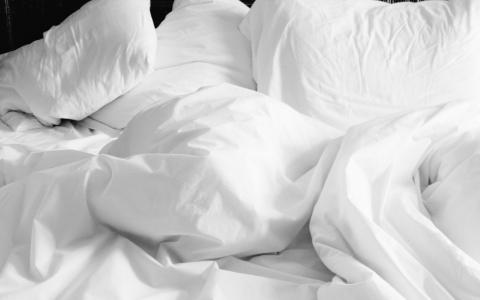
(StyleBlueprint) Watching a rerun of “Criminal Minds” just before bed or indulging in just one more slice of double-fudge cake before you brush your teeth … The mindless things we do during the day or just before bed can contribute significantly to whether we get a restful night’s sleep — or not.
Popularized by Gwyneth Paltrow in her 2016 book Goop: Clean Beauty, “clean sleep” outlines some basic rules for catching a quality snooze. Some are a little less palatable than others (no caffeine after 2 p.m. and keeping the strictest of bedtime routines), while others fall on the luxurious side (Where can I buy a copper-infused pillow?).
“Clean sleep is just another name for good, natural sleep hygiene,” says Dr. Chris Winter, a Charlottesville, Virginia-based a sleep specialist and author of The Sleep Solution: Why Your Sleep Is Broken and How To Fix It. Your sleep hygiene is made up of your everyday habits that improve your ability to fall asleep — and stay asleep.
First, identify sleep issues.
Dr. Winter divides his patients into two categories: those who have difficulty with fatigue, and those who are excessively sleepy. “The people who have trouble staying awake in church, nodding off at work — these patients are excessively sleepy,” says Dr. Winter. “And they’re candidates for sleep apnea,” a condition that affects sleep by blocking airways.
“When our airways collapse as we sleep, we have a very fragmented night of rest,” Dr. Winter says, and it can lead to serious negative consequences, from weight gain to stroke. And the South isn’t usually characterized as being the healthiest of all regions, he adds. Sleep apnea can often contribute to some of these issues.
“We roughly estimate that a quarter of the adult U.S. population has some sort of apnea,” he says. “Being able to do things and being ‘fine’ are two very different things.”
Insomnia is different. Insomniacs don’t feel like they have a problem, Dr. Winter explains. They shrug at sleeplessness and approach it with a characteristic negative attitude.
Many still simply fall into a period of deprivation when something prevents adequate sleep. “Maybe you have two jobs, or just had twins, and they’re up crying in the night — being sleep deprived is very different from insomnia, but [I] tend not to distinguish the two,” says Dr. Winter.
And then there’s sleeplessness. A family member is sick and it’s stressing you out, or you’re up watching season three of “The Handmaid’s Tale” and you can’t sleep. That’s normal. “Varying sleep ability is part of the human condition.” And, he adds, sleep always wins: “When your body wants sleep, you can’t stop it.”
If you’re having sleep issues, figuring out why is a much healthier place to start than simply popping a sleeping pill or turning to other meds. Is it your routine, or is it something in passing that’s bothering your restfulness?
Focus on the things you can control.
According to the American Academy of Sleep Medicine (AASM), a lot is within your control when it comes to healthy sleep hygiene. Start by setting a bedtime that’s early enough for you to get at least 7 hours of sleep, and keep your schedule as consistent as possible.
Dr. Winter says changing your schedule based on sleep is the worst thing you can do. “If you’re up until 1 a.m. and call into work to say you can’t make it [so you can sleep], you’re changing your schedule based on sleep,” he says. “That’s the beginning of the end. You have to keep the schedule to need the sleep.”
But what if you can’t fall asleep? Get out of bed and do something else, like reading, according to the AASM. Write a letter to a friend or work on a crossword puzzle. Don’t scroll through Instagram or check work email — these behaviors not only expose your eyes to bright lights that signal to your brain that you should be awake, but they may induce stress.
As a general recommendation, the AASM suggests turning off all electronic devices at least 30 minutes before bed. Maybe you decide against binging on episodes of “Friends” on your laptop in bed, Dr. Winter jokes.
If you’re hungry at night, eat a light, healthy snack, not a full meal, and avoid all caffeine and alcohol before bedtime hours.
Temperature is also important. In the South summertime heat, it’s not always easy, but keeping your bedroom cool is key. Make sure your environment is cool and dark.
“If you do all the little things and still feel it, that’s when people come see me,” Dr. Winter says. “I like the idea that maybe we’re moving away from pills to find the secret to good sleep.”



